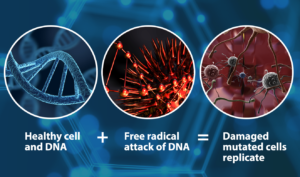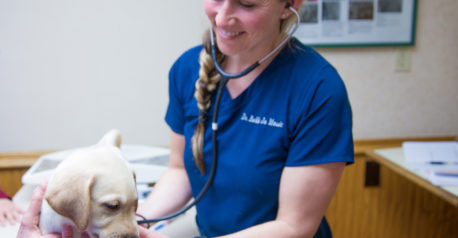Treating Cancer in Pets
CANCER IN CATS AND DOGS
Cancer is an abnormal growth of cells in the body that grow in an uncontrolled way and may spread to other parts of the body. According to cancer researchers, one in three people, one in four dogs and one in five cats will develop cancer in their lifetimes. At one time, cancer was considered a fatal diagnosis, but today, due to advances in medicine, most cancers are treatable and, in some cases, curable.
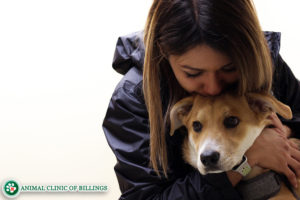
Few diagnoses in the veterinary world bring more distress to a pet owner than cancer. While conditions such as kidney and heart disease can be more difficult to treat and have a poorer chance of survival than some types of cancer, a cancer diagnosis of a furry family member results in serious concern.
A cancer diagnosis is always difficult to hear, but there is hope for treatment and possibly even a cure. The most important step is to get an early diagnosis and begin treatment. Semiannual visits to your veterinarian for a thorough exam are key to finding cancer early, especially with older pets.
CANCER TREATMENT – SURGERY
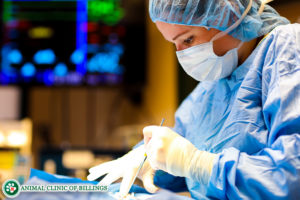 Surgery has long been considered the first and best chance of a cure in many cancers. If certain cancers are found early enough, before they grow too large or have had a chance to spread to other parts of the body, surgery can eradicate them. Surgery also reduces pain, improves quality of life, and even prolongs life when a cure is not possible. Surgery is often combined with chemotherapy or radiation therapy to cure or slow a cancer’s progress.
Surgery has long been considered the first and best chance of a cure in many cancers. If certain cancers are found early enough, before they grow too large or have had a chance to spread to other parts of the body, surgery can eradicate them. Surgery also reduces pain, improves quality of life, and even prolongs life when a cure is not possible. Surgery is often combined with chemotherapy or radiation therapy to cure or slow a cancer’s progress.
CANCER TREATMENT – RADIATION THERAPY
Radiation therapy for pets is not readily available in communities the size of Billings and smaller but can be used to treat many types of cancer and has resulted in dramatic improvements. The treatment uses energy similar to that used to make x-rays, but it is many times stronger and is focused solely on the tumor to spare neighboring cells.
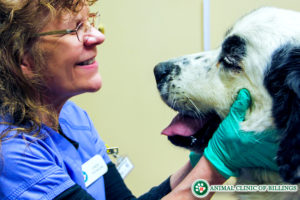
The radiation, or energy produced, kills the cancer cells. Radiation therapy, like surgery, can be curative or can shrink the tumor to help alleviate pain and improve quality of life. Radiation therapy is generally available at veterinary universities’ teaching hospitals and veterinary specialty hospitals in large metropolitan areas.
CANCER TREATMENT – CHEMOTHERAPY
Chemotherapy is the use of drugs that destroy cancer cells. There are many chemotherapy drugs and protocols available to veterinarians who provide these services. Some cancers in pets can only be treated with chemotherapy, but it is commonly used in conjunction with surgery or radiation therapy to try to control the spread of cancer or kill cells that escaped surgery or radiation.
The primary goal of chemotherapy is to slow or stop the progression of cancer without causing a decreased quality of life for the patient. Most everyone is aware of the possible side effects of chemotherapy in humans – especially nausea and hair loss.
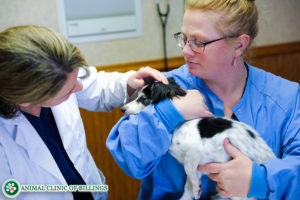
Fortunately, dogs and cats generally tolerate chemotherapy much better than human patients. Most veterinary chemotherapy patients will not have to be hospitalized, and side effects can often be minimized or prevented to maintain the quality of life we want for our pets.
OTHER TREATMENTS FOR CANCER
Immunotherapy is among recent advances in cancer treatment. Vaccines have been developed for veterinary patients, not to prevent cancer but to assist in treatment. There is currently a vaccine for lymphoma patients in remission following chemotherapy and a vaccine for oral melanoma in dogs that can aide in a prolonged life while preserving quality of life.
Adjunctive treatments include medications to alleviate certain symptoms of cancer such as pain and nausea. Additionally, improved nutrition has shown to enhance the quality of life of veterinary cancer patients and has even extended pets’ life expectancy.

The key to a cancer-free healthy pet, especially as pets get older, is early detection and prevention of disease.
Please call to schedule an appointment or a senior wellness examination with one of our veterinarians today!
406-252-9499 REQUEST AN APPOINTMENT


